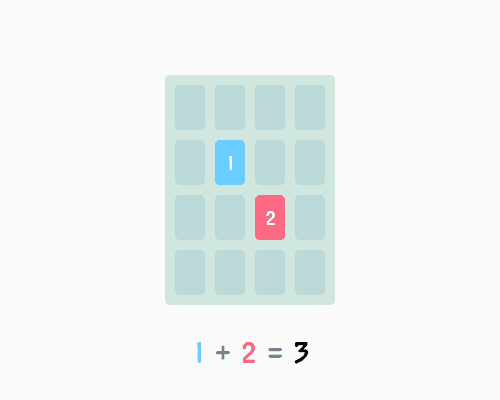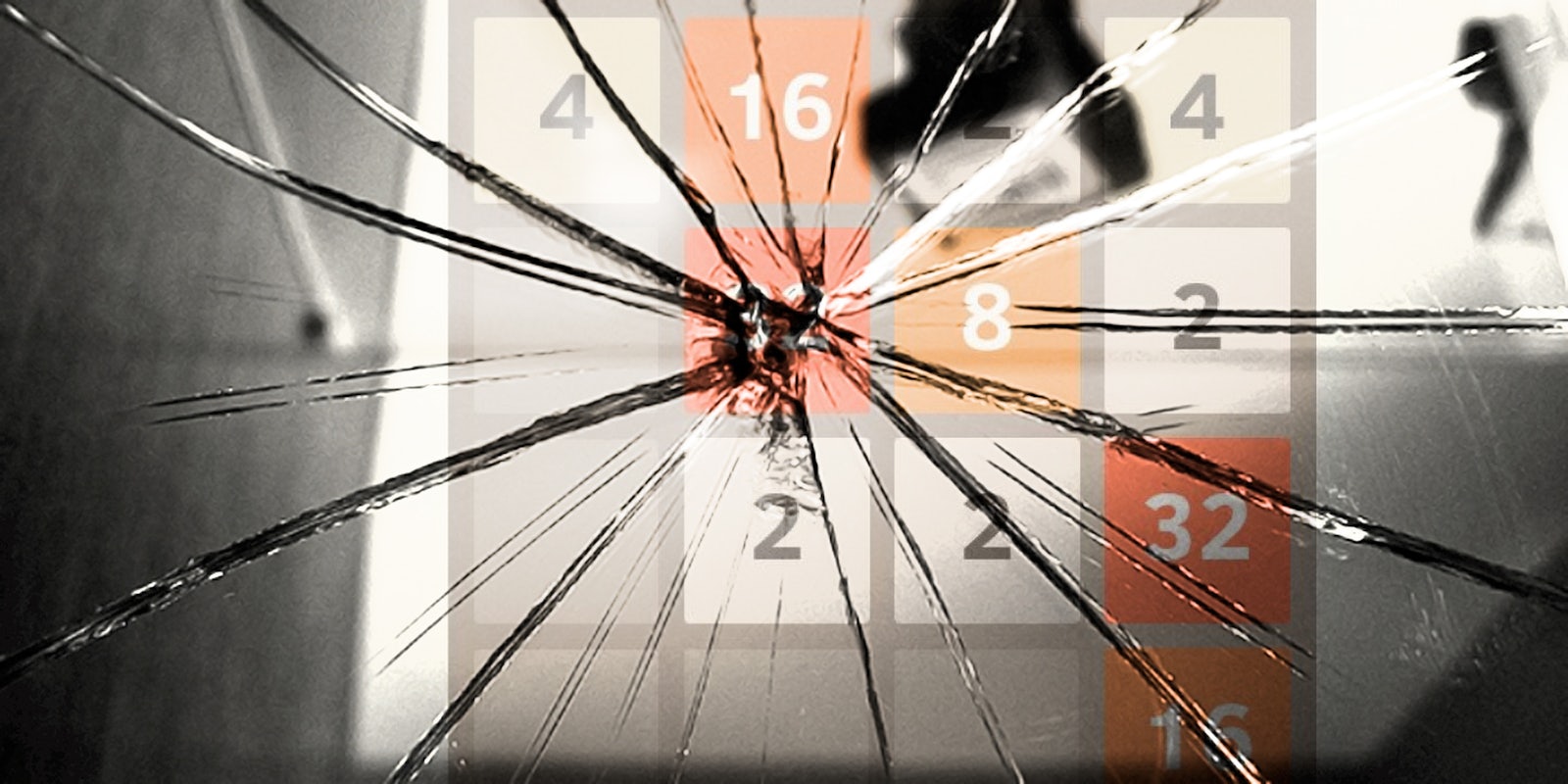Considering it was created in a single weekend by a teenage programmer in Italy who had never even attempted designing a video game before, 2048 is nothing short of an unimaginable success. The math-based game, which involves combing same-numbered tiles arranged on a four-by-four grid until the player creates a tile sporting the titular score, has racked up countless plays by people all across the globe.
In fact, 2048 received over 4 million visitors in less than a week recently.
The game’s designer, 19-year-old Gabriele Cirulli, even joked on Twitter about how his creation may have made a noticeable dent in global productivity levels:
28000 people playing #2048game right now. The amount of man-hours spent playing this game will never be returned to humanity.
— Gabriele Cirulli (@gabrielecirulli) March 12, 2014
However, for all of 2048’s popularity, Cirulli has barely made any effort to monetize his product. The game doesn’t cost anything to play on a Web browser and a mobile version can be downloaded on GitHub for free. There are no ads or in-game purchases designed to give frustrated players a leg up in exchange for a buck or two. In fact, the only personal revenue source Cirulli added to the game are a pair of buttons grateful 2048 addicts can use donate via Paypal or directly to his Bitcoin wallet. (Based on the record of Bitcoin transactions going to the address Cirulli listed, he’s made about $850 in donations since the game was released.)
The reason for Cirulli’s reticence to take a payout can be found in a note nestled just above those donation buttons:
Cirulli created 2048 as a update of an already existing game called 1024, a paid app released by the Beijing-based developer Veewo Studio. The main difference between the two games is that 2048 takes one extra step to complete.
READ MORE:
The simple trick to getting a high score in 2048
In fact, in a post to Hacker News shortly after his game’s release, Cirulli noted his game wasn’t even the first 2048. There’s another game called 2048 created by a game designer going by the handle Saming. Cirulli’s game is virtually identical to Saming’s except that Saming’s game doesn’t animate the blocks as they move. Cirulli added animations because he found they made the game easier to play.
Like Cirulli, Saming’s project is also entirely donation-based. In a FAQ about the game, Saming wrote:
Q: You’re just a shitty ripoff
A: That’s not a question. But yes, I did copy the concept from other guys. However they had it on Android and iOS only and my mobile isn’t compatible. You know what is compatible with almost anything ? A web page. That’s compatible with PCs, tablets, smartphones, consoles… hell even some fridges. I don’t put make the visitors pay anything to play the game, that would be morally bankrupt.
Both versions of 2048, not to mention 1024, are based on another game called Threes. While Cirulli has claimed he had never heard of it when he made 2048, Threes’ rise to the top charts of the puzzle sections of mobile app stores predates all of the clones.
Threes is based on the same premise as the other games, except its gameplay is a bit more complex. Instead of each move throwing all of the tiles to one side of the screen, players shift the board one square at a time. In addition, rather than having all new titles be introduced with the same score, new tiles in Threes come as either ones or twos, which have to be combined to make three—hence the name of the game.

Unlike the 2048s, Threes, which was created by Los Angeles–based game designer Asher Vollmer, costs $1.99 to download.
?[Threes] started with procrastination and an ill-fated attempt at being a broader human being,” explained Vollmer, who had previously developed a game called Puzzlejuice, which plays like a demented mash-up of Tetris and Boggle.
?I wanted to try working on a project that wasn’t game related, so I opened up a Word processor and tried writing a short story. It turns out that writing is the hardest thing on the planet, so I ended up writing two sentences and flailing for the rest of the evening,” he recalled. “Mid-flail I started playing with the arrow keys in Word and watching the cursor move about. That’s when it occurred to me that, ?Hey, I bet I can make a game that only uses the arrow keys.’ I insta-closed Word and opened up Unity and then 10 hours later the very first prototype existed.”
Threes was released in the iOS app store on Feb. 6.
1024 came out a few weeks later with the description, ?No need to pay for Threesgame.”
Cirulli’s 2048 was released on March 9.
By the time 2048 came out, Threes was already sitting atop paid-app charts and gradually started to slide as its virtual clone began to make its ascent. The sudden popularity of 2048 didn’t seem to give Threes a corresponding sales boost.
?The short of it is, it hurts,” Vollmer concluded. ?We applaud innovation and iteration and are actually kind of proud of the impact our legacy has had on the world, but we can’t help but look at the millions of people playing 2048 and feel a smoothie of anger and pride and regret and wistfulness.”
What really irks Vollmer the most isn’t that someone ripped off his game or that people mistake his work as clone. It’s that he believes Threes is actually a better, more thoughtful game than 2048. Vollmer’s evidence, as laid out in a blog post, is the fact that it’s possible to get a really good score in 2048 by alternately pressing up and right and then occasionally pressing down or left a single time when when you get stuck. You won’t beat the game, but you’ll probably get your highest score ever. In fact, Vollmer claims he was able to beat 2048 on his first try.
On one level, the entire history of video games is largely one of developers taking the ideas of what’s come before and expanding on them. What are games like the Call of Duty series but a take off of Halo, which is a take off of Marathon, and so on. You can trace it back all the way back to Quake, Doom, and before than, Wolfenstein 3D.
But the issue now is largely a question of speed. A game can be posted to a mobile app store and then get cloned almost immediately. A quick search of the Google Play store shows a handful of other games clearly aimed at taking advantage of Threes’ popularity—like Fives or Number Three—along with a sea of apps that are obvious derivations from 2048.
It doesn’t hurt that Cirulli didn’t just release the game for free on GitHub—he also posted the source code for the program itself. If someone wants to create a 2048 clone, like 2048 Numberwang or Doge 2048, he or she doesn’t have to build it from scratch.
On a legal basis, there’s only so much game designers can do to protect their creations.
Developers can copyright their games, but that only covers the actual visual elements and the specific underlying source code. Gameplay elements can be protected by obtaining a patent, but patents in the United States can be expensive to obtain and take over a year to process, which is why that level of protection is typically reserved for hardware rather than software. In a situation where a game can go from the spark of invention to a full, working model in a single frenzied programming session, the six days it takes for App store approval can feel like a lifetime—let alone a year for a patent.
In an essay published on Games Industry International, intellectual property attorney Ben Hur urged game makers to not only take full advantage of all possible legal protections, but also take the fight to the court of public opinion:
One way to challenge a clone is not in the courtroom, but on the web. If your game is cloned, consider launching a media offensive on the blogosphere to draw attention to the cloned game.
At the same time, giving publishers the ability to quash any game that even remotely resembles their past work is far from an ideal solution. Where would be now, for example, if the creators of the Jump Bug, considered the first side-scrolling platform jumper, could have sued Nintendo because the game mechanics of Super Mario Brothers were relatively similar?
Striking that balance is difficult, and as so often happens, it may ultimately have to be decided by the companies who own the platforms on which the apps themselves are sold. In a recent post about the issue, TechCrunch noted that both Apple and Google have taken tentative steps to favor original games over obvious rip-offs.
?We do believe imitation is the greatest form of flattery,” Vollmer insisted, ?but ideally the imitation happens after we’ve had time to descend slowly from the peak—not the moment we plant the flag.”
Photo via shinealight/Flickr (CC BY 2.0) | Remix by Jason Reed



